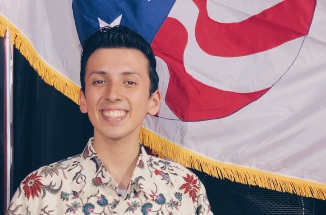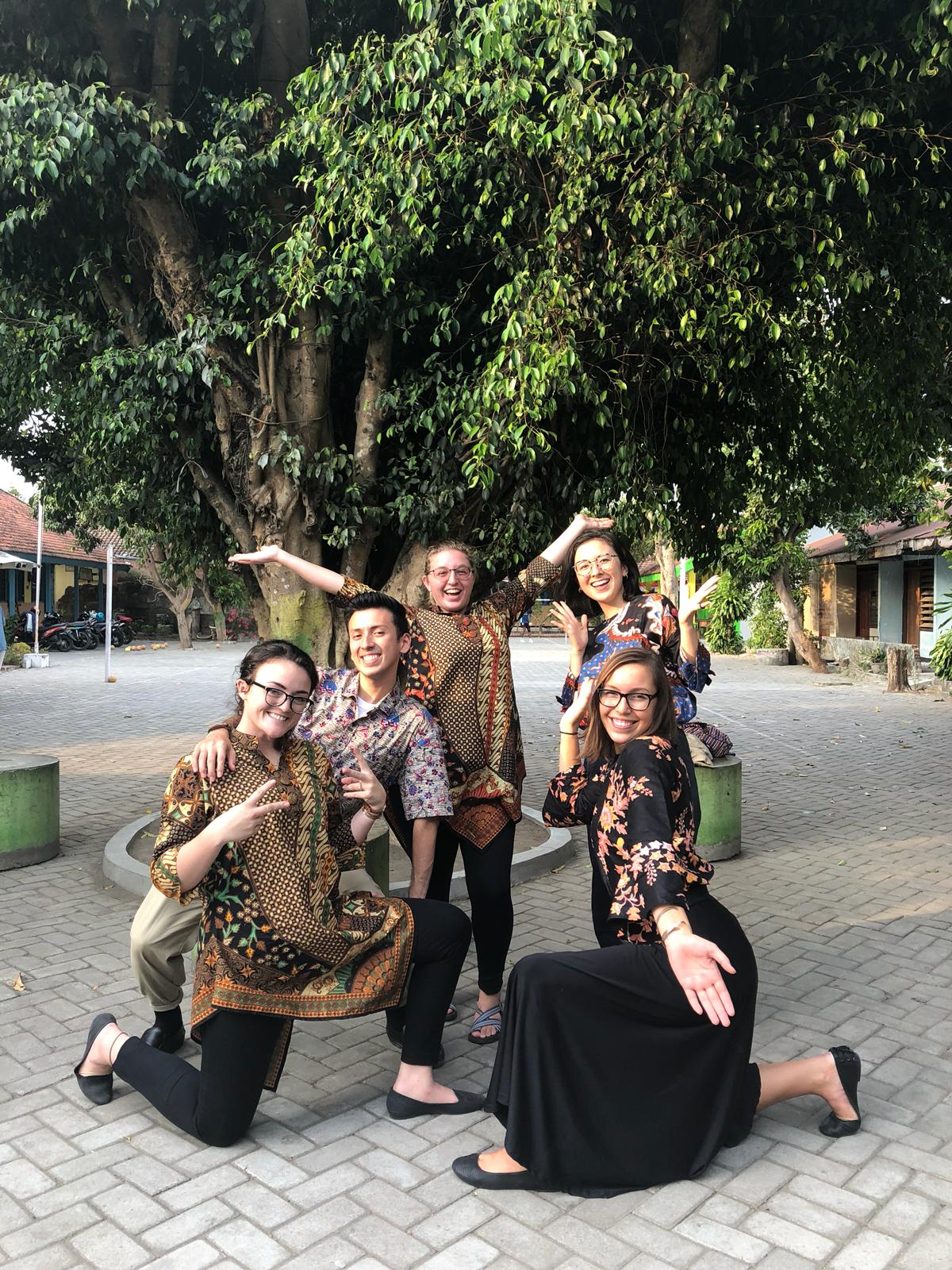
A Day in the Life of Miguel Robles ’18: Peace Corps Volunteer in Indonesia
- Feb 22, 2019
- Peace Corps
Miguel Robles found out about Peace Corps at Global Professional Training: East and Southeast Asia. After getting in touch with past volunteers, he knew this was what he wanted to do.
Robles started his service as an English teacher in Indonesia last December, and his service concludes in December 2020. His experience has been extremely rewarding so far, but he also realized the challenges that come with being a Peace Corps volunteer. “Being a person of color serving as a volunteer presents its own set of challenges that are difficult to overcome because they aren’t necessarily the same that training prepared you for. Just like life in the U.S., it’s important to find your allies and stick together,” he said.
Born in California and raised in Houston, Robles graduated UT with a degree in Communication Studies in May of 2018. One tip he wants to share with students interested in Peace Corps is to talk to current and past volunteers to inform them of what life as a volunteer is like. We caught up with Robles and asked him about what a day in his life is like, lessons he learned as a volunteer and what UT students should do if they are interested in Peace Corps.
Miguel, what does your typical day look like?
A typical day usually starts with waking up and getting ready to go to school by 7 a.m. Upon arriving, I go up to every single teacher in the teachers’ lounge and greet them. Then I wait for my counterpart to get to school and tie up any last minute loose ends before heading to classes. School usually ends at around 2:30 p.m. After school, I go to my house and have lunch with my host mom and host brothers. After lunch, everyday sort of differs. I spend the time between lunch and dinner doing different things that need to get done. I’m either running errands, studying Indonesian, looking into new ideas to use in the classroom, playing with my host brothers, or anything else that needs to get done. At around 8 p.m., I have dinner with my host family. After dinner, I go to my room and the rest of the night is cleared for Me Time. Taking time to yourself and being alone isn’t really a concept here, so I make sure to allow time to decompress and reflect on the current day and the day to follow.
Why did you decide to join Peace Corps?
I had always wanted to volunteer abroad, and I found about Peace Corps at a conference held by Texas Global, the Global Professional Training program for East and Southeast Asia. I was sold after talking to past volunteers and decided to apply. I wanted the Indonesia English teacher position, but I applied for any job in any country in order to not slim my chances of getting an invitation. Somehow, it worked out that I got the position I wanted without giving them any indication that I wanted it. It all just seemed to work out, so I took it as a sign that it was meant to be!
Describe your community and location.
I live in a fairly large region in a medium-sized town. Coffee culture is big here, so a lot of the students that attend the university down the road from my neighborhood spend their time at coffee shops that are pretty modern. It kind of reminds me of a mini-Austin because it’s big on coffee and fairly less conservative than the surrounding areas. In fact, it’s also been described as “weird” by past volunteers that have lived here.
Describe your job.
I teach at a Muslim middle school, and this semester I am teaching 7th and 8th graders. My students are a bundle of energy, and it can be hard to match that at times. However, this energy is what inspires me to keep striving to be a better teacher. I teach with two fellow English teachers (counterparts) for each grade, so I plan every lesson with them and teach with them in the classroom. I just started teaching in mid-January, so I still have a lot to learn!

What is your favorite part about being a Peace Corps Volunteer?
My favorite part about being a Peace Corps Volunteer is all of the people I’ve met since embarking on this two-year long journey. In such a short time, I have grown so close to some of my fellow volunteers who I never would have met back in the U.S. Also, included in this is the people I have met from Indonesia. I would have never imagined that I could build such strong relationships with people who live on the other side of the world from where I grew up in such a short period of time.
What are the hardest parts about being a Peace Corps Volunteer?
There are definitely times when you feel really lonely. You can be surrounded by the nicest and most caring people, but still feel completely isolated. These feelings can last for days or even weeks, and it’s always hard to look forward so you can get past it. Being a person of color serving as a volunteer presents its own set of challenges that are difficult to overcome because they aren’t necessarily the same that training prepared you for. Just like life in the U.S., it’s important to find your allies and stick together.
What have you learned about yourself through your service?
I’ve learned that I have really been holding myself back for years. Back in the U.S., it is so easy for me to make excuses on why I don’t want to do something. Here, sometimes I have no other option but to do whatever that “thing” is. I am actually more capable than I give myself credit for, and being here has really proven that.
How will your service impact your career or career goals?
I am considering international sustainable tourism, and Indonesia is the perfect place to be to learn more about this sector because it is a huge tourist destination. Since I want to work in an international context, I feel that my service is giving me that first step. I now have experience living in a different country, in a different culture, speaking a different language and meeting people from all over the world.
What are your plans after you complete your service?
I do plan to attend graduate school after service, but I’m not yet sure if that will be right after or if I will wait a year or two and continue to work abroad.
What have you gained because of your experience in Peace Corps?
For starters, I had to learn how to ride a bike, so I gained that. I’ve really seen myself grow as an individual because I have been out of my comfort zone more since I’ve been here than I have my entire life in the United States. Also, being in a new country really pushes you to reflect and learn more about your own country, culture and identity.
What would you say to current UT students considering applying to Peace Corps?
If you are already considering applying and think it might be for you, just go ahead and apply. At any point during the process, you can decide to decline. You don’t want to think back on this time and think “What if I would have applied?” You’ll never know until you shoot your shot! Also, talk to current volunteers! Even if you haven’t applied yet and especially if you have already received an invitation. Ask current volunteers literally anything that you can think of. We’ve all been in your position and are willing to help.
With this, I will also say that it will definitely help if you reach out to volunteers who share similar identities as you. If you are a person of color or identify as LGBTQ, try to reach out to volunteers who are also part of these communities. This will give you a better sense of the challenges and experiences that you might face that you might not necessarily read about on all of the blogs. If you cannot find anyone, just ask any volunteer you are in contact with to connect you.
I was terrified to message a stranger and ask them about their experience, and I absolutely wish I would have done it. Current volunteers can and will tell you exactly what you need to know and will share the good, the bad and the ugly. Along with that, reach out to more than one volunteer because everyone has different experiences. That being said, take their words with a grain of salt because your experience will be unique to you.



